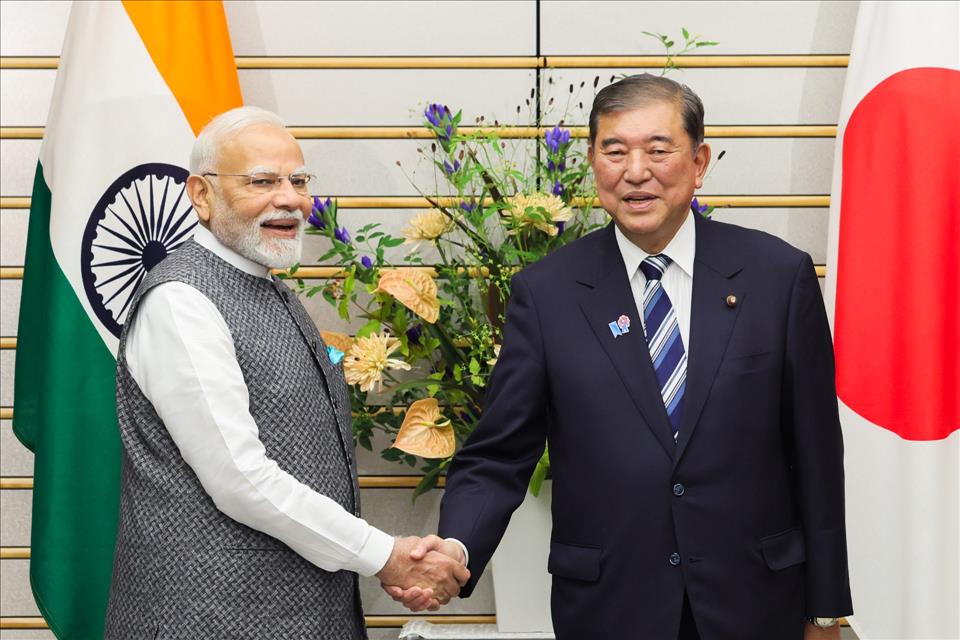Japan, India Pms Agree On New Framework For Economic Security
(MENAFN- Kuwait News Agency (KUNA))
TOKYO, Aug 29 (KUNA) -- Japanese Prime Minister Shigeru Ishiba and his Indian counterpart Narendra Modi on Friday confirmed plan to launch a new framework for economic security, affirming that the two countries' special strategic and global partnership is entering a new stage.
At their summit meeting in Tokyo, Ishiba and Modi welcomed the adoption of 11 outcome documents, including a joint statement and a "joint vision" outlining directions in fields such as environment, healthcare, and local government exchanges for the coming decade, according to a joint statement issued after their talks.
The two leaders highlighted the establishment of a new Economic Security Initiative to strengthen collaboration in semiconductors, critical minerals, pharmaceuticals and artificial intelligence.
They also confirmed the revision of the 2008 Joint Declaration on Security Cooperation to include concrete defense measures.
Furthermore, both sides set a new goal of JPY 10 trillion (USD 65 billion) in Japanese private-sector investment in India over the next decade, and endorsed an action plan for more than 500,000 people-to-people exchanges within five years, including 50,000 Indian skilled workers in Japan.
In addition, Ishiba and Modi reaffirmed their commitment to a free and open Indo-Pacific and expressed concern over regional and global challenges, including North Korea's missile and nuclear activities, the situation in Ukraine, and the humanitarian crisis in Gaza.
At the joint press conference, Ishiba underlined Japan's complementary relationship with India. "India is the world's most populous nation and a source of innovation, while Japan has advanced technologies driving global growth. By combining our strengths and helping each other solve challenges, we can build a mutually beneficial relationship that will serve our peoples and the world," he said.
Modi emphasized the economic and strategic dimension of the partnership. "Our Special Strategic and Global Partnership has entered a new era, and we have drawn up a roadmap for the next decade.
Cooperation in economic security will be central, with semiconductors and rare earths as priorities. I believe Japan's technology and India's talent are the perfect combination," he said. Modi also expressed commitment to advancing infrastructure projects such as high-speed rail, ports, aviation, and shipbuilding, and reiterated India and Japan's shared vision of a free and open Indo-Pacific. (end)
mk
At their summit meeting in Tokyo, Ishiba and Modi welcomed the adoption of 11 outcome documents, including a joint statement and a "joint vision" outlining directions in fields such as environment, healthcare, and local government exchanges for the coming decade, according to a joint statement issued after their talks.
The two leaders highlighted the establishment of a new Economic Security Initiative to strengthen collaboration in semiconductors, critical minerals, pharmaceuticals and artificial intelligence.
They also confirmed the revision of the 2008 Joint Declaration on Security Cooperation to include concrete defense measures.
Furthermore, both sides set a new goal of JPY 10 trillion (USD 65 billion) in Japanese private-sector investment in India over the next decade, and endorsed an action plan for more than 500,000 people-to-people exchanges within five years, including 50,000 Indian skilled workers in Japan.
In addition, Ishiba and Modi reaffirmed their commitment to a free and open Indo-Pacific and expressed concern over regional and global challenges, including North Korea's missile and nuclear activities, the situation in Ukraine, and the humanitarian crisis in Gaza.
At the joint press conference, Ishiba underlined Japan's complementary relationship with India. "India is the world's most populous nation and a source of innovation, while Japan has advanced technologies driving global growth. By combining our strengths and helping each other solve challenges, we can build a mutually beneficial relationship that will serve our peoples and the world," he said.
Modi emphasized the economic and strategic dimension of the partnership. "Our Special Strategic and Global Partnership has entered a new era, and we have drawn up a roadmap for the next decade.
Cooperation in economic security will be central, with semiconductors and rare earths as priorities. I believe Japan's technology and India's talent are the perfect combination," he said. Modi also expressed commitment to advancing infrastructure projects such as high-speed rail, ports, aviation, and shipbuilding, and reiterated India and Japan's shared vision of a free and open Indo-Pacific. (end)
mk
.jpg)
Legal Disclaimer:
MENAFN provides the
information “as is” without warranty of any kind. We do not accept
any responsibility or liability for the accuracy, content, images,
videos, licenses, completeness, legality, or reliability of the information
contained in this article. If you have any complaints or copyright
issues related to this article, kindly contact the provider above.
Most popular stories
Market Research

- United States Lubricants Market Growth Opportunities & Share Dynamics 20252033
- UK Digital Health Market To Reach USD 37.6 Billion By 2033
- Immigration Consultancy Business Plan 2025: What You Need To Get Started
- United States Animal Health Market Size, Industry Trends, Share, Growth And Report 2025-2033
- Latin America Mobile Payment Market To Hit USD 1,688.0 Billion By 2033
- United States Jewelry Market Forecast On Growth & Demand Drivers 20252033






















Comments
No comment